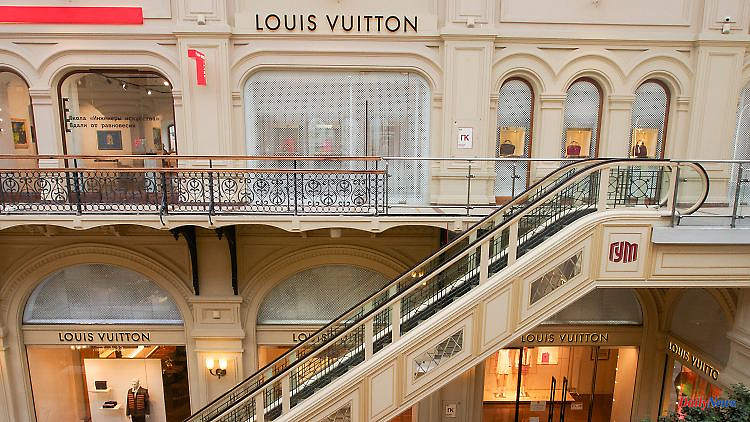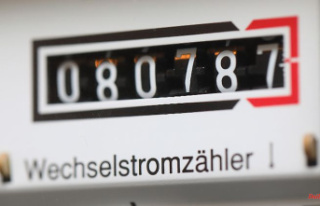The EU and its allies are punishing Russia's invasion of Ukraine a year ago with the heaviest sanctions a country has probably ever seen. The economy groans, but the hoped-for shock effect does not materialize. Why? ntv.de spoke to Eastern Europe expert Janis Kluge about the "Russian experiment" and why the Kremlin government is still holding out.
ntv.de: In May - three months after Russia invaded Ukraine - you said that the sanctions "will be drastic for Russia". In fact, Russia is holding up surprisingly well. How do you explain this misjudgment?
Janis Kluge: I would continue to stand by this assessment. The effect of the sanctions is drastic, but it is developing much more slowly and some extreme scenarios have not materialized. In the first two weeks after the sanctions were introduced, the Russian banking system wobbled, and a financial crisis seemed a possibility. But after a few days, the bank runs, i.e. the queues of people in front of the ATMs, disappeared again and the Russian central bank got the liquidity problems at the Russian banks under control again.
So monetary policy was an important factor, but nobody had it on their radar?
The fact that the Russian central bank made no major mistakes was certainly important. But when a financial crisis occurs, there are also psychological processes at work that are difficult to predict. A vicious circle sets in because no one trusts the institutions anymore and then the institutions really collapse. In the Russian case, no such vicious circle has started.
Western countries have imposed increasingly severe sanctions on Russia because of the war of aggression against Ukraine. Why haven't they brought the desired result so far?
The large caliber of sanctions introduced in the early days of the war came as a surprise. The damage it would do was difficult to quantify. Such tough measures against such a large, internationally networked economy were new, an economic experiment. There was a high level of uncertainty. At the time, even some Russian institutes were expecting a slump in GDP for 2022 of ten percent or more. Today we know more about the effect of the sanctions - and that there are also other external factors, for example the international commodity markets, ...
... which helped Russia a lot last year.
The freeze on central bank reserves was therefore a measure that looked drastic at first, but ultimately had little effect in the first year. Russia had very high current foreign exchange earnings due to continued oil and gas exports. Moscow was not dependent on these reserves at all. It was also clear that it would be incredibly difficult to apply pressure in this way. In addition, the Russian central bank was very creative. When she no longer had access to her dollars and euros, she forced the big Russian exporters to exchange their dollars and euros for rubles. In doing so, it created artificial demand for the falling currency, which stabilized it.
Which sanctions were successful?
A combination of the technology embargo, i.e. the West no longer exporting certain technologies to Russia, and the withdrawal of Western companies was effective. This resulted in severe production slumps in Russian vehicle construction and in sectors such as aviation. A side effect of this was that Russia spent less foreign exchange. The slump in imports resulted in even larger surpluses in the trade balance. You can see how things intertwine.
The strongest measures are likely to be those taken most recently: the EU oil embargo in December and the embargo on oil products in early February. Here you can now see a clear effect in the household. On the one hand, these measures weaken the ruble, on the other hand, they curb the state's oil and gas revenues. This is important because the money is used to finance the war. We'll have to wait a few more months to see if this effect is permanent.
You mentioned it: Immediately after the war began, many large international companies announced their withdrawal from Russia. How has the Russian economy changed as a result?
As has been shown, the withdrawal is sometimes not that easy. Moscow wants to keep as many foreign investors in the country as possible and is therefore making it as difficult as possible for them. Buyers are no longer easy to find. Sanctioned persons and companies are sometimes out of the question. For the few financially strong oligarchs or entrepreneurs in Russia who have not yet been sanctioned, the exodus turns out to be a shopping Eldorado, because foreign companies can be had relatively cheaply. Many investors are selling at a symbolic euro, perhaps with a buyback clause if they wish to return in the next six years. The Russian state has also bought up companies.
In order to fill gaps, Russian companies have invested more than ever before in the past year. This signals an unintended strength from a western point of view.
The investments are surprising at first, but can be explained well: Because of the sanctions, the companies have to find replacements for the missing materials and machines from the West. Importantly, this is an unusual type of investment. When investments are made in Germany, the companies are interested in possible profits in the future. In Russia, on the other hand, investments are forced by the lack of goods or suppliers. They don't signal strength, but fill gaps - often with poorer quality products. Although this increases the gross domestic product in the present, it does not bring lasting growth.
After a year of war in Ukraine, there is now a big hole in the Russian state budget. How long can Kremlin boss Putin keep the economy running under the pressure of the sanctions?
A collapse is definitely not imminent for the Russian economy. These are all gradual developments over the next few years. There are still great uncertainties, as various measures have only just been introduced. One thing is certain: Russia has less budget revenue and spending - especially for the war - has skyrocketed. The situation has worsened. But it is not yet critical. In 2023 it will not be that either. Russia could still compensate for a budget deficit of five percent of gross domestic product this year.
And how?
Even if interest rates have risen, the Treasury can still take on new debt - also because Russia had such a low national debt before the war. Another possibility would be tax increases. An extra tax for companies is being discussed. There was something like that for Gazprom last year.
A third solution is the so-called National Welfare Fund. Even if the budget hole was plugged last year, there are still around four percent of gross domestic product in liquid funds. In addition, Russia is deferring all expenses that are not urgently needed now. For example, there is less investment in road construction. If necessary, the central bank could even print money. That, too, can keep the Russian budget afloat for quite some time. Of course, that would have side effects, in the form of rising inflation, for example. It will therefore be very important to look at this over the next few years, because it will determine the government's room for maneuver in the future.
Transparency International has still identified large flows of money from dubious Russian sources in the UK. Does the West also lack the necessary will to enforce the sanctions?
Western financial centers are indeed an integral part of the Putin system and Russian corruption. For a variety of reasons, however, it is not so easy to deal with. On the one hand, there is the question of political will, because there are also local business interests in the financial centers. On the other hand, our legal system also shows us limits. To determine whether money from Russia is dirty or clean, we need data leaks. An international seal of approval for clean money would help, but there isn't that much transparency. We don't want to expropriate on suspicion. According to our understanding of the law, this means it is better to tolerate a corrupt oligarch and not dispossess innocent Russians for it.
Does that mean we have to brace ourselves for a long conflict with Russia?
We are experiencing a turning point. This is not a temporary state that will be over in two years. Some things that happened in the last year will still concern us in 10 and 20 years. The break with Russia will probably be permanent. We will see a very strong militarization and "securitization" of the continent, regardless of how this war develops.
Diana Dittmer spoke to Janis Kluge












